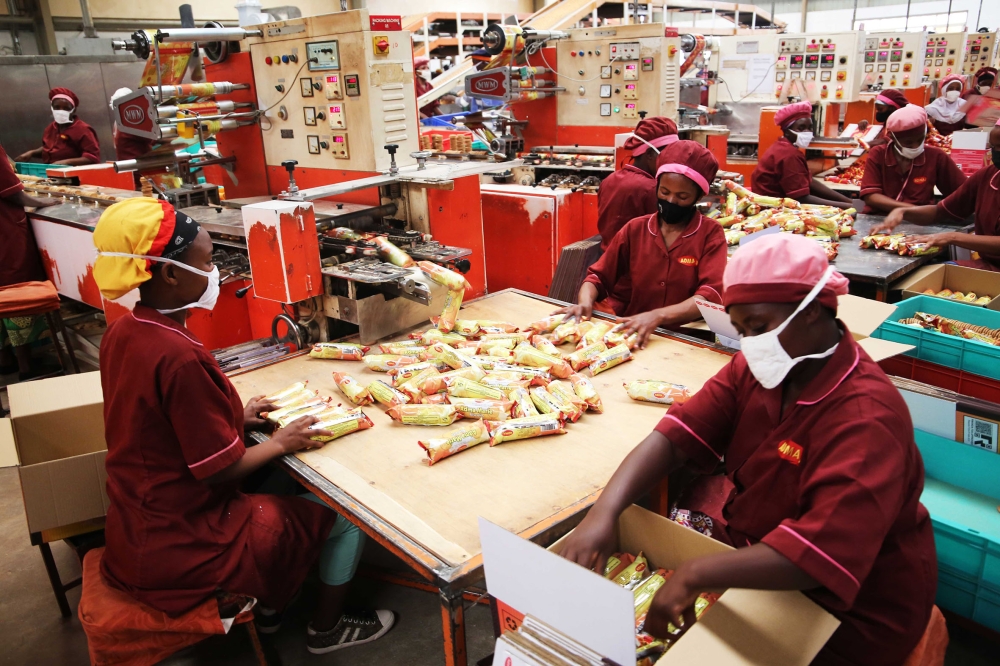

Fifteen years ago, Master Steel was only making iron sheets. But, currently, it is producing over 10 items of construction materials, and almost quadrupled its initial production as Rwanda’s housing needs have been growing, according to the Company Sales and Marketing Manager.
Constantin Rugaba made the disclosure while speaking to The New Times as Rwanda held the celebrations to mark Africa Industrialisation Day last week in Kigali.
Rugaba said that factories making construction materials have registered progress, especially in line with the development of the country where there are many infrastructures [projects] that should be executed.
He indicated Master Steel -- a local firm mainly engaged in steel construction material production – produces about 20,000 tonnes of construction materials per month, which is about four times more than its initial production of about 5,000 tonnes in 2007.
"As housing increases, we also expand [our production]. We have installed more machinery. We started with manufacturing iron sheets, but currently we make more than 10 items,” he said.
The company started with iron sheets, but it gradually diversified products as it included tubes, metallic open profiles (window frames), nails, water pipes, among other items, pointing out that all that implies the expansion of the factory and investment, he elaborated.
In the gro-processing sector, Martin Kabatsi for Africa Improved Foods (AIF) said that before AIF come into existence in 2015 through a Public Private Partnership (PPP) model with the Government of Rwanda – as a joint venture – the World Food Programme used to procure food for relief from Europe.
AIF is the first approved producer of Super Cereal Plus in Africa, by the UN World Food Programme (WFP) – the world’s largest humanitarian organisation saving lives in emergencies, through providing food assistance to hungry children and families.
Super Cereal Plus is a formulated breastfeeding complementary food product, commonly used by humanitarian organisations like WFP and the International Committee of the Red Cross (ICRC) to treat and prevent moderate acute malnutrition among infants between six months and 59 months (below five years of age).
Information from WFP indicates that the introduction of the first African supplier of Super Cereal Plus – Africa Improved Foods – took place in 2017.
"Now, the World Food Programme, through their Rome Office, is sourcing [food] from Africa, particularly Rwanda. The World Food Programme procures close to about 55,000 metric tons of fortified foods, which are distributed around the world in war-torn countries, for relief,” Kabatsi said. Adding that the firm has created an impact in fighting malnutrition in Rwanda.
Meanwhile, Rugaba said that there is still a challenge of access to raw materials "since we are not yet able to have the capacity to locally produce the raw materials that we need to make the construction materials.
He cited the cost of transport, and the time spent product shipment into the country, which makes raw materials reach the country while expensive.
Meanwhile, Briggette Harrington, President and CEO of Igire Coffee company, said that manufacturers must prioritise product quality, and have consistency in their production and supply chain, if they are to take advantage of the business opportunities presented by the African Continental Free Trade Area (AfCFTA).
"The first thing that we have to take care of is ensuring that quality for whatever product that we want to export, or even to sell to ourselves is the highest quality possible,” she said.
Another issue that must be addressed is lack of packaging materials in Africa, which makes manufacturers resort to imports, pointing out that "the cost of packaging is very expensive,” and that should be addressed.
More manufacturing contribution to GDP needed
Chris Ngugabe, Director of Macroeconomic Policy at the Ministry of Finance and Economic Planning said that the contribution of manufacturing to Rwanda’s gross domestic product (GDP) has been around eight to nine per cent, but that of the industry sector as a whole stands at 20 per cent.
"I think that [for] manufacturing, which is actually the real industrialisation, we can go up to 15 per cent [contribution to GDP] and even higher, because if you look at the world average, manufacturing contributes around 13 per cent, but some countries like China go up to 27 [per cent],” he said, calling for beefing up the sector and continue to invest in that area.
According to GDP National Accounts 2021 by the National Institute of Statistics of Rwanda (NISR), the country’s GDP was estimated at over Rwf10.9 trillion in 2021.
NISR’s GDP annual estimates for 2010/11 for Rwanda showed that the industry sector accounted for 16 per cent of the country’s over Rwf3.4 trillion GDP in the financial year 2010/11.
Rwanda’s industry consists of mining and quarrying, as well as manufacturing which include food, beverages and tobacco, textiles, clothing and leather goods.
Other products of manufacturing include wood and paper; printing, chemicals, rubber and plastic products, non-metallic mineral products, metal products, machinery and equipment, furniture and other manufacturing, water and waste management, and construction.
Meanwhile, Ngugabe said that the country’s programme for industrial parks and special economic zones, "is really key for us to boost our manufacturing sector in Rwanda, but we still lack some investments, but we are getting there.”


